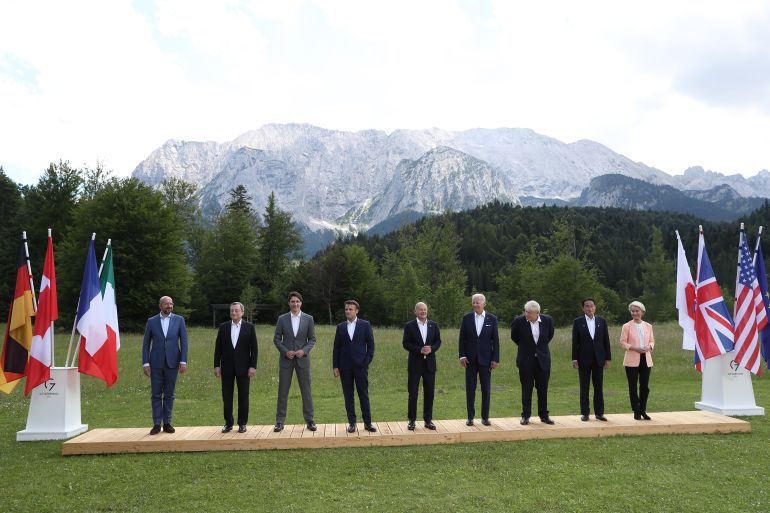G7 leaders wrap up summit, pledge tougher action against Russia
Leaders of the world’s richest democracies say they will impose ‘severe and immediate economic costs’ on Moscow for its invasion of Ukraine.

The leaders of the world’s wealthiest democracies have pledged during a meeting in Germany to isolate Russia as they struck a united stance to support Ukraine for “as long as it takes” against Moscow’s invasion.
In their final statement on Tuesday from the Group of Seven (G7) summit, Canada, France, Germany, Japan, Italy, the United Kingdom and the United States, along with the European Union, underlined their intent to impose “severe and immediate economic costs” on Russia and look into far-reaching steps to cap Kremlin income from oil sales that are financing the war, now in its fifth month.
Keep reading
list of 3 itemsThousands of protesters arrive as G7 convenes in Germany
G7 leaders discuss price cap on Russian oil over Ukraine invasion
The communique did not include key details on how the fossil fuel price caps would work in practice, setting up more discussion in the weeks ahead to “explore” measures to bar imports of Russian oil above a certain level. That would hit a key Russian source of income and, in theory, help relieve the energy price spikes and inflation afflicting the global economy as a result of the war.
“We remain steadfast in our commitment to our unprecedented coordination on sanctions for as long as necessary, acting in unison at every stage,” the leaders said.
The price cap would in theory work by barring service providers such as shippers or insurers from dealing with oil priced above a fixed level. That could work because the service providers are mostly located in the EU or the UK and thus within reach of sanctions.
To be effective, however, it would have to involve as many consuming countries as possible, in particular India, where refiners have been snapping up cheap Russian oil shunned by Western traders.
Participants also agreed on a ban on imports of Russian gold and to step up aid to countries hit with food shortages by the blockage of Ukraine grain shipments through the Black Sea.
Before the summit’s close, leaders joined in condemning what they called the “abominable” Russian attack on a shopping centre in the Ukrainian town of Kremenchuk, calling it a war crime and promising that Russian President Vladimir Putin and others involved “will be held to account”.
On Monday, the leaders had also pledged to support Ukraine “for as long as it takes” after conferring by video link with Ukrainian President Volodymyr Zelenskyy.
Zelenskyy has openly worried that the West has become fatigued by the cost of a war that is contributing to soaring energy costs and price hikes on essential goods around the globe. The G7, which has sought to assuage those concerns, condemned “Russia’s war of aggression” in Ukraine, saying it is “dramatically aggravating” the global hunger crisis, which is expected to leave about 323 million people at risk of food insecurity.
The wealthy countries committed an additional $4.5bn to address global hunger, while calling on Russia to “end its blockade of Ukrainian Black Sea ports” and other actions that have impeded Ukrainian production and exports of grains.
The G7 also called on countries and companies with “large food stockpiles” to “make food available without distorting the markets”.
Key NATO summit
From the secluded Schloss Elmau hotel in the Bavarian Alps, the G7 leaders will move to Madrid for a summit of NATO leaders, where Russia’s invasion of Ukraine will again dominate the agenda.
All G7 members – other than Japan – are NATO members, and Japanese Prime Minister Fumio Kishida has been invited to Madrid.
On Monday, NATO Secretary-General Jens Stoltenberg announced the Western military alliance would increase the size of its rapid reaction forces nearly eightfold, from about 40,000 soldiers to 300,000, as part of its response to an “era of strategic competition”.
Coupled with other measures including the deployment of forces to defend specific allies, Stoltenberg said the move to expand NATO forces is part of the “biggest overhaul of collective defence and deterrence since the Cold War”.
While the G7’s annual gathering has been dominated by Ukraine and by the war’s knock-on effects, host and German Chancellor Olaf Scholz was to show that the bloc can also move ahead on pre-war priorities.
Group members pledged on Tuesday to create a new “climate club” for nations that want to take more ambitious action to tackle global warming. The club will be open to countries committed to the 2015 Paris Agreement goal of limiting global temperature increases to 1.5 degrees Celsius (2.7 Fahrenheit) and achieving carbon neutrality by 2050.
Scholz, who spearheaded the proposal, said it would allow countries to accelerate climate action while avoiding competitive disadvantages.
“We agree that we need more ambition to achieve our climate goals,” Scholz told reporters at the end of the summit. When countries develop national strategies to decarbonise their economies, “we want to ensure we do not work against each other and isolate ourselves from each other”, he said.
Environmentalists, however, have criticised the club as vague on details and unnecessary, saying there are already enough international platforms for climate cooperation.
Without firm commitments on setting a minimum carbon price or imposing sanctions on non-complying members, Scholz’s pet project risked becoming “just another club”, said Greenpeace Germany’s Executive Director Martin Kaiser.